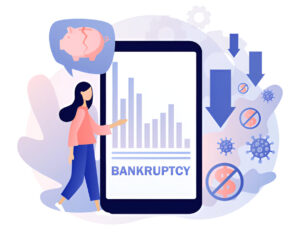What Happens When Influencers in Texas Face Bankruptcy

It’s easy to assume that influencers—those stylish content creators lighting up our feeds—are immune to financial trouble. But the reality? Even the most-followed creators can hit hard times. Whether it’s a sudden dip in brand deals, canceled contracts, or algorithm changes tanking engagement, bankruptcy is a very real possibility. Especially in Texas, where influencer income isn’t always steady and legal protections vary.
So, what can Texas-based influencers do when their digital revenue streams dry up? How can they protect their brand, their income, and their future?
Let’s break it down.
Why Are Texas Influencers Filing for Bankruptcy?
Influencers, despite their glamorous appearances, are often gig workers without traditional financial safety nets. Here’s why bankruptcy among creators is becoming more common:
-
Unpredictable income from platforms and sponsors
-
High upfront costs for content creation (equipment, travel, stylists)
-
Legal disputes over copyright or breached sponsorship contracts
-
Lack of formal financial planning or income tracking
-
No employer-based benefits (like health insurance or retirement)
When that monthly revenue dips below the cost of living—or worse, debt repayment—bankruptcy becomes a last-resort lifeline.
As noted in this Forbes article exploring financial instability among influencers, even creators with massive followings face inconsistent income due to platform algorithm shifts, market saturation, and limited monetization models. Without a plan in place, even a few lost deals can spiral into financial crisis.
How Does Bankruptcy Work for Influencers in Texas?
If you’re Googling “How does Kisch Consumer Law work?” or “Can influencers file for bankruptcy in Texas?”—you’re not alone.
In short: yes, they can. But the process isn’t the same as it is for salaried employees. Influencer income is classified as self-employment or business revenue, which can complicate filing for:
-
Chapter 7 Bankruptcy – liquidation-based and typically faster, but not ideal if you have valuable brand assets or gear
-
Chapter 13 Bankruptcy – allows you to restructure debt while keeping your assets, including your content equipment or business-related IP
Your digital assets (social accounts, ad revenue rights, NFTs, etc.) may be considered part of your estate in a bankruptcy. That’s why you need a law firm that understands both financial law and the digital economy.
Visit this Kisch Consumer Law resource on influencer bankruptcy in Texas for in-depth insights.
Protecting Social Media Income: Can Influencers Safeguard Their Earnings?
Wondering “How do I protect my social media income if I file for bankruptcy?” Here’s what to keep in mind:
Track All Income Streams
-
Keep a spreadsheet or use a tool like QuickBooks
-
Record everything: affiliate links, YouTube ad revenue, TikTok Creator Fund payments, brand collaborations, etc.
Separate Personal and Business Finances
-
Use a business bank account for influencer income
-
File taxes correctly with IRS Form 1099 or Schedule C
Consider Forming an LLC or Corporation
-
This can protect your personal assets from business-related debts
Consult a Lawyer Who Understands Digital Revenue
-
That’s where Kisch Consumer Law comes in—they help Texas creators build a legal strategy to keep content income flowing and avoid future pitfalls
What’s the Best Way to Handle Digital Revenue Loss?
If your content creation is drying up and the bills are stacking up, here’s a quick action plan:
-
Evaluate all debts and income sources
-
Cut or pause unnecessary expenses (editors, stylists, paid tools)
-
Reach out to creditors for potential settlements or deferments
-
Consult a legal team to explore restructuring or bankruptcy
-
Protect brand-related IP and data (logos, trademarks, mailing lists)
Pro Tip: Treat your brand like a business. Even TikTokers need lawyers.
Why Choose Kisch Consumer Law?
You’re not just any client—you’re a creator, a brand, and a business. Kisch Consumer Law gets that.
Here’s what makes them a top choice for Texas influencers facing bankruptcy:
-
Experience with influencer bankruptcy Texas cases
-
Knowledge of digital asset protection
-
Texas-based consumer protection expertise
-
Custom solutions tailored to content creators, streamers, and freelancers
-
Free resources and consultations for qualifying clients
Read more about how Kisch Consumer Law helps creators protect digital income and recover.
FAQs: Bankruptcy and Influencers in Texas
Can influencers really declare bankruptcy like a traditional worker?
Yes. But their income is treated differently. It’s best to consult with a firm like Kisch that understands influencer income as business revenue.
Do I lose my social media accounts if I go bankrupt?
Not necessarily. Some digital assets can be protected during bankruptcy—especially if they’re essential to ongoing income.
What type of bankruptcy should I file as an influencer?
Depends on your assets and debt load. Chapter 13 is often better for creators who want to maintain operations while restructuring.
How do I protect my personal brand legally?
Trademark your name, establish an LLC, and work with a law firm like Kisch Consumer Law for full protection.
Ready to Reclaim Your Revenue?
Let’s be honest—algorithms don’t pay bills. Brand deals don’t last forever. But smart legal protection? That’s the content strategy every influencer needs.
Bankruptcy isn’t the end of your career. It’s the reset button you might need.
Visit Kisch Consumer Law to explore data-driven legal strategies for influencers in Texas
Final Thoughts: Can Bankruptcy Go Viral?
Sure, if your audience loves financial transparency. But seriously, bankruptcy doesn’t mean failure. It means you’re protecting what matters most. Your brand. Your voice. Your future.
So don’t wait until you’re filming TikToks from your parents’ guest room. Call in the pros.
Kisch Consumer Law is your legal influencer for the real world.
